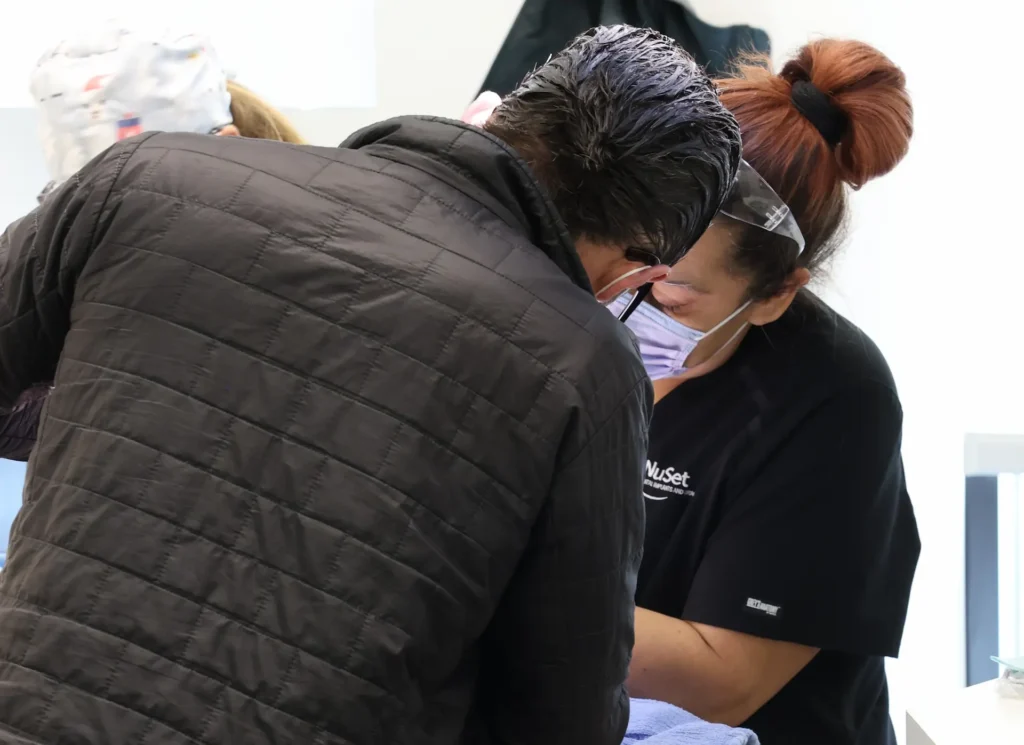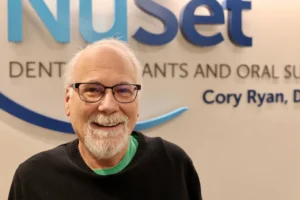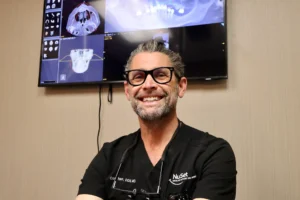Your teeth do more than just help you eat. They’re essential for speaking clearly and smiling with confidence. But when something feels off, like a sharp pain from a hot drink or gums that bleed while brushing, it’s easy to brush it off and hope it gets better on its own.
The truth is, dental problems don’t go away without treatment. A small cavity can turn into a painful infection. Gum disease can develop silently and lead to tooth loss. And once a tooth is gone, the root no longer stimulates the jawbone, which can cause the bone to slowly shrink over time.
But here’s the good news: You have options. Most dental issues can be prevented with good habits. And if damage is already done, dental implants can bring your smile back even stronger while looking natural, and built to last.
Let’s discuss the most common dental problems, how to spot them early, and what to do if you’ve already lost a tooth.
Key Takeaways
- The most common dental issues are cavities, gum disease, sensitivity, bad breath, and tooth erosion.
- Brushing, flossing, regular dental visits, and limiting sugary or acidic foods can protect your teeth and gums.
- Stress can lead to teeth grinding, jaw pain, and even gum problems.
- Some dental problems can be reversed early, while others may need professional care.
- Dental implants provide a strong, lasting solution if you’ve lost teeth.
1. Tooth Decay (Cavities)
Tooth decay happens when plaque (a sticky film of bacteria) builds up on your teeth. When you eat sugary or starchy foods, these bacteria turn them into acids. Over time, the acid wears away your enamel, creating holes, also known as cavities.
Signs to watch for:
- Tooth sensitivity to hot, cold, or sweet foods.
- A visible brown or black spot on a tooth.
- Pain when chewing.
- A rough or pitted texture when you run your tongue over your teeth.
The following can help to prevent cavities:
- Brush twice a day with fluoride toothpaste to strengthen the enamel.
- Floss daily to remove plaque between teeth.
- Cut back on sugar, especially in sticky snacks and sodas.
- Drink water after meals to wash away food particles.
- See a dental specialist regularly for check-ups and professional cleanings.
If caught early, a simple filling can fix a small cavity. But in cases where decay has reached deep into the tooth, it can cause an infection and a filling won’t help to fix the problem. In severe cases, the tooth may need more extensive treatment to deal with the infection.
Losing a tooth to decay doesn’t mean you have to live with a gap. Dental implants replace missing teeth with strong, natural-looking restorations that function just like real teeth. Unlike other restoration methods, implants fuse with your jawbone, preventing bone loss and keeping your smile healthy for years.
2. Gum Disease (Gingivitis & Periodontitis)
Your gums need just as much care as your teeth. When plaque builds up along your gumline, bacteria start to irritate the gums. This early stage is called gingivitis. If left untreated, gingivitus can turn into periodontitis, a more serious infection that damages the bone supporting the teeth. Over time, this can cause loose teeth or even tooth loss.
Here are signs to watch out for:
- Red, swollen, or tender gums.
- Bleeding when you brush or floss.
- Bad breath that won’t go away.
- Receding gums (your teeth look longer than before).
- Loose teeth or changes in your bite.
While Gum disease is the most common cause of adult tooth loss, it doesn’t happen overnight. If caught early, gingivitis can be reversed with better oral care. But once periodontitis sets in it won’t heal on its own. At this stage, bacteria destroy the bone that holds your teeth in place, leading to loose teeth, pain, and extractions.
If you’ve lost teeth due to gum disease, dental implants offer a strong, long-term solution.
3. Tooth Sensitivity
Our teeth have a hard outer layer called enamel. Underneath is a softer layer called dentin, which has tiny tubes leading to the nerves inside the tooth. When enamel wears down or gums recede, those tubes become exposed making the teeth extra sensitive to hot, cold, sweet, or acidic foods.
Here are common signs of tooth sensitivity:
- A sudden sharp pain when eating or drinking something hot or cold.
- Sensitivity to sweet or acidic foods.
- Discomfort when brushing or flossing.
- Pain that comes and goes, especially after eating.
To ease tooth sensitivity, always do the following:
- Use a soft-bristled toothbrush to avoid enamel damage.
- Switch to desensitizing toothpaste (like Sensodyne) to block nerve signals.
- Limit acidic foods and rinse with water after eating them.
- Avoid extreme temperatures in food and drinks.
- Get fluoride treatments to strengthen your enamel.
If a tooth is too damaged from wear, decay, or fractures, it may need to be removed. But just because you have lost a tooth it doesn’t mean you have to continue living with a gap: Dental implants replace missing teeth with strong, natural-looking restorations. Unlike other restoration methods, they feel and function just like real teeth, so you can eat and drink comfortably again without pain.
4. Bad Breath (Halitosis)
One of the biggest causes of bad breath is poor oral hygiene. When you don’t brush and floss regularly, food particles and bacteria build up in the mouth. Over time, build up creates plaque, which releases foul-smelling odors- resulting in foul-smelling breath. If left untreated, this can lead to more serious problems like cavities and gum disease, both of which can make bad breath worse.
A dry mouth can also lead to bad breath. Saliva plays a big role in washing away food particles and bacteria. But if the mouth isn’t producing enough saliva due to medications, dehydration, or certain medical conditions, bacteria multiply faster, creating a stale or sour odor.
Here are signs to watch out for:
- A white or yellow coating on the tongue.
- A dry, sticky feeling in your mouth.
- A bad taste that won’t go away.
To get rid of bad breath, do the following:
- Brush twice a day, and don’t forget your tongue!
- Floss daily to remove trapped food between teeth.
- Drink plenty of water to keep your mouth moist.
- Use an antibacterial mouthwash to kill odor-causing bacteria.
- Chew sugar-free gum if you have a dry mouth.
If a decayed or infected tooth is causing chronic bad breath, removing it and replacing it with a dental implant can help.
5. Tooth Erosion
Tooth erosion happens when the protective enamel wears away, leaving your teeth vulnerable. Unlike cavities, which form in one spot, erosion affects the entire surface of the tooth.
Acidic foods and drinks are a major cause of tooth erosion. Citrus fruits, soda, energy drinks, and vinegar-based foods weaken the enamel over time. Even healthy choices like lemon water can be harmful if consumed too often.
Acid reflux (GERD) can also play a big role. Stomach acid is extremely strong, and when it comes back up into the mouth, it eats away at the enamel. People with frequent heartburn or reflux may experience tooth erosion without realizing it.
Plus, while brushing too hard might seem like a good habit, using too much pressure can actually damage your enamel. A hard-bristled toothbrush or aggressive scrubbing can wear down the protective layer over time.
Here are signs you may be suffering from tooth erosion:
- Teeth that look shorter or worn down.
- Increased sensitivity to hot, cold, or sweet foods.
- Rounded or smooth edges on teeth.
- A yellowish tint, as the inner dentin layer gets exposed.
- Small cracks or chips forming easily.
To protect your teeth:
- Use a straw when drinking acidic beverages to limit contact with teeth.
- Rinse with water after eating acidic foods instead of brushing right away.
- Switch to a soft-bristled toothbrush and use gentle strokes.
- Wear a nightguard if you grind your teeth while sleeping.
- Limit sugary and carbonated drinks that speed up erosion.
How to Prevent Dental Problems and Maintain a Healthy Smile

A healthy mouth means fewer trips to the dentist, no painful surprises, and a confident smile you can feel good about. Here’s how you can prevent dental problems and maintain a healthy smile:
Brush and Floss Every Day
Regular good dental habits will help ensure your teeth remain healthy and problem free. Simple habits, like brushing and flossing every day, goes a long way toward keeping your smile healthy.
- Brush twice a day with a fluoride toothpaste.
- Floss once a day to remove food and plaque between your teeth.
- Don’t skip the tongue, as bacteria love to hide there.
Watch What You Eat and Drink
Your diet plays a big role in your dental health, and what you eat and drink will always impact your health- including your dental health.
- Limit sugary snacks and drinks. Sugar feeds bacteria that cause cavities.
- Drink more water. It helps wash away food and bacteria.
- Eat crunchy fruits and veggies. They help clean your teeth naturally.
- Avoid acidic drinks like soda and citrus juices. They can wear down enamel.
Protect Your Teeth from Damage
Your teeth are strong, but they’re not indestructible. There are certain things you can do that will help protect your teeth from potential damage:
- Wear a mouthguard if you play sports.
- Don’t use your teeth as tools. No opening bottles or tearing packages!
- If you grind your teeth, get a night guard. It protects against damage.
Keep Your Gums Healthy
Healthy gums mean healthy teeth, here’s how you can contribute to keeping your gums healthy:
- Look out for bleeding or swollen gums. These could be early signs of gum disease.
- Use an antibacterial mouthwash to reduce bacteria.
- Quit smoking, as this weakens your gums and increases your risk of infection.
Visit Your Dental Specialist Regularly
Even if your teeth feel fine, regular checkups help catch small problems before they turn into big ones.
- Schedule a cleaning every six months. Plaque and tartar build up no matter how well you brush.
- Get X-rays if needed. They help detect hidden cavities or bone loss.
- Talk to your dental specialist about any pain or sensitivity. Don’t wait until it gets worse.
Even with great care, accidents, aging, and health conditions can lead to tooth loss. When that happens, dental implants offer a permanent, natural-looking solution. They replace missing teeth, restore function, and help prevent bone loss in your jaw.
Protect Your Smile for Life with Expert Care
Your teeth are more than just part of your smile—they affect how you eat, speak, and feel every day. From cavities to gum disease and missing teeth, dental problems don’t fix themselves.
The best way to keep your mouth healthy is prevention. But when damage is already done, the right treatment can restore your smile and protect your long-term health.
At NuSet Dental Implants and Oral Surgery, we specialize in permanent solutions for missing or failing teeth. Whether you need to replace a single tooth or restore your entire smile, our advanced dental implant treatments give you strong, natural-looking teeth.
If you’re struggling with tooth pain, missing teeth, or any oral health issue, we’re here to help. Schedule a consultation now to get started!
Frequently Asked Questions
What are the most common dental problems?
The most common dental problems include cavities, gum disease, tooth sensitivity, bad breath, cracked or broken teeth, and tooth erosion. Other issues like dry mouth, oral infections, and teeth grinding can also affect oral health. While many of these problems can be prevented with good oral hygiene, some may require professional treatment to avoid serious complications.
What is the most painful dental problem?
A dental abscess (a tooth infection) is one of the most painful dental problems. It happens when bacteria enter the tooth’s root, causing severe swelling, throbbing pain, and sensitivity. Other painful conditions include cracked teeth, advanced gum disease, and severe tooth decay. If you’re experiencing constant or intense dental pain, see a dental specialist immediately. Ignoring it can lead to tooth loss or a more serious infection.
Can stress cause teeth problems?
Yes! Stress can lead to teeth grinding (bruxism), jaw pain, gum disease, and even mouth sores. Many people grind their teeth while sleeping, putting extra pressure on their teeth and gums. Stress can also weaken the immune system, making it harder for your body to fight off infections like gum disease. If you clench your jaw or wake up with pain, talk to your dental specialist about a nightguard to protect your teeth.
Can dental disease be cured?
Some dental diseases, like gingivitis (early gum disease) and minor cavities, can be reversed with proper care and treatment. However, more advanced conditions like periodontitis (severe gum disease) and tooth decay that reaches the root cannot be cured, but they can be managed with professional treatment. In cases where teeth are beyond repair, dental implants offer a permanent solution to restore function and appearance.





